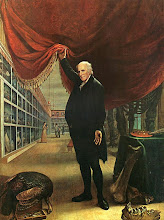This weekend, news reports were full of finger-wagging over the death by trampling of a temporary worker, Jdimytai Damour, at a Wal-Mart store in Long Island on Friday. His death, the coverage suggested, was a symbol of a broken culture of consumerism in which people would do anything for a bargain.It is always bracing to have someone in the daily news business actually look back at what the media was saying on an earlier day, without The Daily Show or an historian having to do it for them. Carr confirms a thought that has crossed my mind the last several Thanksgivings: far from a grand holiday tradition, this "Black Friday" pandemonium is a relatively recent development. More specifically, it is part of the 1990s-and-after bubble economy that has hyper-inflated and over-institutionalized every minor cultural practice and leisure activity from Halloween haunted houses to children's sports and contests to card-playing to the keeping of friggin' scrapbooks. It has all been part of the process by which we have created an economy that produces little and sustains itself largely (and uncertainly) on consumer spending, or "the casualties and caprice of customers" as a certain sage once wrote. And the media has been there encouraging the phenomenon every step of the way, especially in its "lighter" content and advertising. The NYT has been no better than most of the others on this score, supplying a steady diet of lifestyle porn in its technology and real estate coverage, especially.
The willingness of people to walk over another human being to get at the right price tag raises the question of how they got that way in the first place. But in the search for the usual suspects and parceling of blame, the news media should include themselves.
Just a few days ago, the same newspaper writers and television anchors who are now wearily shaking their heads at the collective bankruptcy of our mass consumer culture were cheering all of it on.
Carr helps make Damour's death and the new "Black Friday" into historically locateable and intelligible cultural events. His supposition that the current BF phenomenon only goes back about a decade seems to be right on target. In the Proquest Historical Newspapers database, the NYT's first mention of Black Friday in a non-stock market crash context appears to have occurred on November 25, 1995. Headlined "Stores Full, But Shoppers Seem Wary," Jennifer Steinhauer's piece introduced readers to the term as a bit of arcane, somewhat outdated retail lore:
Retailers call the day after Thanksgiving "Black Friday" because they hope it starts a season that turns their books the same color. But the critical importance of the day has faded a bit over the years. Once the biggest shopping day of the year, it is now exceeded by several other days closer to Christmas, as shoppers now hit the stores later and later in the season in search of last-minute price cuts. Many retailers still see the day, however, as a gauge for the rest of the season.Significantly, Steinhauer's article was a postmortem report on the beginning of the shopping season. As the Internet-bubble 'n' consumer-bauble economy took hold in the mid-Clinton years, the media would increasingly anticipate and set expectations for the day, previewing the best deals and gathering breathless comments from retailers, shoppers, and those omnipresent "analysts" about just how important and exciting and all-consuming Black Friday would be. Naturally, all that anticipation and those helpful shopping tips come surrounded with paid advertising for those self-same post-Thanksgiving sales. Carr refrains from making the obviously accurate accusation that whether or not Black Friday actually helps retailers profit from the holiday season -- given the associated extra costs of mounting the massive sales and the depth of the discounts offered, one would have to guess not -- the industry for which the Thanksgiving holiday really does make the difference is the media itself. Is it an accident, I wonder, that the media's frenetic promotion of Black Friday in its news coverage has coincided with a wave of consolidation and downsizing and general financial decline, especially in the print media?
[Also published at Publick Occurrences.]
----------------
Now playing: Cloud Cult - Everybody Here Is A Cloud
via FoxyTunes





No comments:
Post a Comment